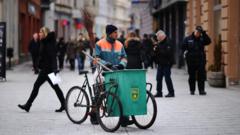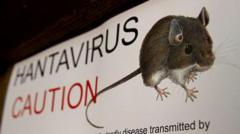As rodent populations swell in Sarajevo, authorities scramble to address a public health crisis linked to rising cases of rat-borne illnesses like leptospirosis.
Crisis Unleashed: Rat-Borne Diseases Spike in Sarajevo

Crisis Unleashed: Rat-Borne Diseases Spike in Sarajevo
Sarajevo faces a public health emergency as rampant rodent populations lead to a surge in rat-related diseases.
In the heart of Sarajevo, a troubling resurgence of rat populations has led to alarming health concerns as reports of rat-borne diseases rise. Images circulating on social media show enormous numbers of rats floating in the Miljacka River, much to the horror of local residents, who have also documented overflowing trash and illegal dumping. These conditions create ideal breeding grounds for rats, which in turn pose significant health risks for inhabitants.
Health experts are particularly worried about the uptick in leptospirosis cases. On one recent day alone, Sarajevo’s largest hospital reported a dozen new infections; this follows a string of other cases throughout the month. Nicknamed "rat fever," the disease typically spreads through water or soil contaminated with rodent urine or feces, leading to a range of symptoms from headaches and muscle pain to more severe conditions like Weil's disease, which can lead to jaundice and kidney failure.
In response, local authorities have declared an epidemic and are rolling out emergency measures to combat the rat population. The strategy includes deploying additional municipal workers to conduct thorough clean-ups in public areas, enhanced refuse collection schedules, and urging schools to sanitize their playgrounds and inspect their buildings for rodent infestations. This response starkly contrasts the apathy of the past two years, during which effective pest control measures were nonexistent—a situation explained by a failed tender process for extermination services.
Sarajevo Canton Health Minister, Enis Hasanovic, emphasized that what they face is not just a health crisis but a broader communal crisis, pointing to the local government's failure to maintain address basic municipal hygiene standards. Former Director of Sarajevo's University Clinical Centre, Sebija Izetbegović, warns that without immediate action, the situation may worsen, as the well-fed rats could lead to the emergence of other diseases like hantavirus.
Although the current cases of leptospirosis have remained non-lethal, and none have exhibited severe symptoms thus far, the high mortality rate associated with untreated severe cases (over 50%) looms over the city like a dark cloud. It leaves both residents and health officials with a substantial challenge ahead as they try to reclaim Sarajevo from the clutches of the rapidly proliferating rodent population.
















